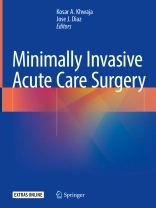This text is designed to present a comprehensive, up to date and safe approach to managing emergency general surgery patients with a minimally invasive approach. This book bridges the gap between the minimally invasive surgery (MIS) expert who may not routinely be involved in the care of the acute care surgery patient and the ACS expert surgeon who may not have a routine MIS elective practice.
The first section reviews the physiology of the acute care surgery patient and the physiologic impact of MIS techniques including pnemoperitoneum in critically ill patients. This review is crucial to assure that the surgeon has a clear understanding of when a MIS approach is safe and when it can be potentially dangerous to the patient.
The illustrations are presented in an atlas-style format to describe the surgical procedures. The authors of the various sections are minimally invasive and acute care surgeons from prominent academic centers. The format represents a narrative review with appropriate illustrations and links to online videos.
Jadual kandungan
Physiologic Effects of Pneumoperitoneum: Implications of Laparoscopy in Critically Ill Patients Undergoing Emergency Minimally Invasive Surgery.- Laparoscopic Exploration for Free Air.- Incarcerated Abdominal Wall Hernias: Tips and Tricks to the Minimally Invasive Approach.- Laparoscopic Approach to the Acutely Incarcerated Paraesophageal Hernia.- Acute Care Surgery for Bariatric Surgery Emergencies.- Managing the Difficult Gallbladder in Acute Cholecystitis.- Minimally Invasive Approach to Choledocholithiasis.- Laparoscopic Approach to Perforated Ulcers.- Minimally Invasive Strategies for the Treatment of Necrotizing Infected Pancreatitis: Video-Assisted Retroperitoneal Debridement (VARD).- Laparoscopic Management of Small Bowel Obstruction.- Management of Appendicitis.- Minimally Invasive Approach to Acute Diverticulitis.- Laparoscopic Re-exploration for Colorectal Surgery Complications.- Minimally Invasive Approaches to Clostridium Difficile Colitis.- Bedside Laparoscopy in the Intensive Care Unit.- Laparoscopic Exploration for Trauma.
Mengenai Pengarang
Kosar Khwaja, MD, MBA, MSc, FRCS, FACS
Director of Acute Care Surgery, MGH
Associate Director, Trauma Program
Critical Care Medicine
Mc GIll University Health Centre
Mc Gill University
Department of Surgery
Montreal, Quebec
Canada
Jose J. Diaz, MD, CNS, FACS, FCCM
Professor of Surgery
Chief Division of Acute Care Surgery
Program Director Acute Care Surgery Fellowship
Program in Trauma
R Adams Cowley Shock Trauma Center
University of Maryland Medical Center
Baltimore, MD
USA












